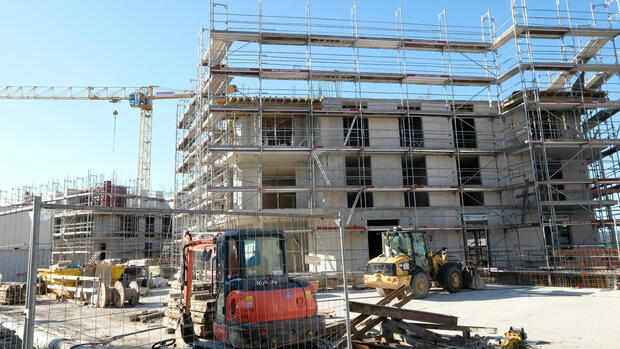According to Klaus Wohlrabe, head of surveys at the Ifo Institute, there is currently great uncertainty in the housing construction market.
(Photo: dpa)
Munich More cancellations than ever before, but no new orders. High interest rates and rising material costs are causing a crisis in construction. Some companies even fear bankruptcy. A new survey by the Munich Ifo Institute provides alarming figures and shows: The crisis in German housing construction is getting worse.
In August, 20.7 percent of participating companies reported canceled projects, after 18.9 percent in the previous month. Since 1991, at least 500 companies from the construction industry have been surveyed every month to collect data.
“Cancellations in residential construction are piling up to a new high,” said the head of the Ifo surveys, Klaus Wohlrabe. “We have not observed anything comparable since the survey began in 1991. The uncertainty in the market is huge.”
>> Read also: Where property buyers in the metropolitan areas save money
As a result of the rapidly increasing construction costs and the significantly higher interest rates, many projects that were still profitable at the beginning of 2022 are no longer profitable today. The following five graphics show how deep the crisis is in the construction industry.
The legislature sets stricter criteria for state construction funding, for example for energy-efficient renovations. As a result, many builders receive less or no government support. “This puts a strain on the builders’ calculations,” added Wohlrabe. As a result, more and more construction companies found themselves in trouble.
The order books of some companies are still well filled. But 44.2 percent of the companies surveyed are already reporting a lack of orders.
For comparison: a year earlier the proportion was only 13.8 percent. “Some companies are already up to their necks in water,” said Wohlrabe.
More financing difficulties for housing construction
Currently, 11.9 percent of the residential construction companies surveyed reported financing difficulties. “This is the highest value in over 30 years,” said Ifo expert Wohlrabe. The Ifo Institute only recorded higher values for financing difficulties in the construction industry in the first year of data collection, 1991.
For comparison: Even during the financial crisis, less than five percent of companies reported financing difficulties to the Ifo Institute every month. In 2021, the average number of companies with financing problems was only 1.25 percent.
Pessimistic outlook for the construction industry
For the next six months, the majority of companies fear that business will get worse: the barometer for business expectations is at minus 60.1 points, an “extraordinarily weak level,” according to the Ifo Institute.
>> Read also: Will property prices continue to fall?
Since data collection began, the industry’s business prospects have only been worse in the period from December 2022 to February 2023.
The Federal Association of Independent Real Estate and Housing Companies (BFW) is calling for countermeasures from the federal government due to the crisis. “The historic high in cancellations and the enormous lack of orders prove that our warnings of the crash are now coming true,” said BFW President Dirk Salewski in Berlin.
The association calls for the additional purchase costs to be reduced, financing and funding conditions to be formulated more clearly and planning and approval procedures to be simplified and accelerated.
Construction companies assess their business situation critically
According to the Ifo Institute, most construction companies currently view their situation critically. When assessing the business situation, the value was minus 38 percent, the lowest level since June 2009.
The construction crisis is one reason why leading institutes have a negative view of the German economy. The Ifo Institute, for example, assumes that gross domestic product will shrink by 0.4 percent this year.
The European Central Bank (ECB) is fighting high inflation with rising interest rates, which makes investments in construction and other industries more expensive and thus slows down the economy.
With agency material
More: What happens after the real estate boom ends
